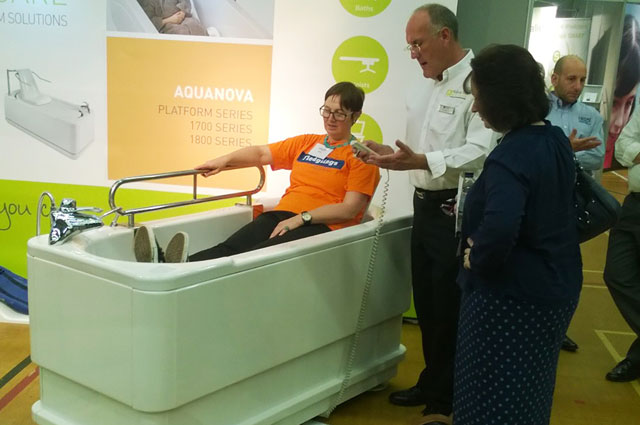The benefits of an assisted bath
An outline article for Occupational Therapists involved with housing adaptations
By Kate Sheehan, OT.
If you are a Housing Occupational Therapist, most of your career is spent thinking about bathing in terms of how essential it is for a person to bathe. Shaping our clinical reasoning has been the rhetoric of health and social care legislation, where we have to judge the needs upon the merits of a person’s “medical” requirement to bathe. All too often, this line of clinical reasoning leads to those conversations where we hear yourselves murmuring those fateful words “that’s a want, not a need.”

We even comfort ourselves with the nonsensical belief that a person’s want or desire to have a bath is, somehow, comparable with most people’s aspiration to have the latest luxury gadget! Thank goodness then for the Care Act (2014), which places well-being and a person’s aspirations at the centre of the assessment process. Because of the new rhetoric of the Care Act, we want to explore how occupation-focused practice can help us to explain the well-being benefits of bathing.
Let’s quickly explore the term “occupational-focused practice” and how this closely aligns with one of the key well-being principle’s underpinning the Care Act.
As Occupational Therapists, we fundamentally believe that health and well-being is achieved when a person is able to do the everyday activities they want, aspire, or need to do, and in a way of their choosing. Then, if you were to ask us about the intervention we can offer we would say – we work with people, using a combination of education, advice, equipment, and/or adaptions to enhance, restore, or maintain their performance in the everyday activities they want, need, and aspire to do, and in a way of their choosing. This to me is occupation-focused practice and it seem to align nicely with the following personal dignity principles within the Care Act:
- Physical and mental health and emotional well-being
- Control by the individual over day-to-day life
- Participation in work, education, training, or recreation
- Domestic, family and personal relationship
- Suitability of living accommodation
People want, need, and aspire to bathe for a variety of reasons. We’re not going to dwell on the medical benefits of bathing; we think we all know these. Instead we want to explore the other benefits, the ones we’ve perhaps forgotten about but which occupation-focused professional reasoning helps us to remember. The first is the person with the chronic long-term physical condition.
Often they will not have a medical need to bathe, but what about their sense of emotional well-being and control over daily life they experience from the rest and replenishment effects of bathing? Not only this, but the improvements they experience in sleep quality from having a relaxing bath, increasing their resilience to cope with the psychological impact associated with living with a long term condition.
Next situation is the person who is deemed to have adequate access to facilities. Perhaps the person has learning disability or dementia, making the experience of using the “accessible” shower disorientating, confusing, and frightening. Again, there is no medical need to bathe, particularly given there is a fully accessible shower, but imagine the physical and emotional trauma (day in, day out) of being forced to do an activity that causes you so much distress. In these types of situations, using occupation-focused language, we can immediately articulate the benefits of bathing. It will provide a more humane and relaxing way to maintain the person’s hygiene needs. The carer also gets to spend quality time with the individual, where their focus is on developing and maintaining a relationship with the person and not on having to manage behaviour.
So in summary, is the Care Act finally our opportunity to articulate how we can offer, through occupation-focused professional reasoning, an effective approach to understanding the complexity of health and well-being of people looking for statutory services support?
If it is, which I hope you agree it is, we will also have to consider how we will manage the challenges that will inevitably arise from the increased pressure of funding services, equipment and/or adaptation. How we deal with the challenges of limited financial resources is undeniably complex and we don’t have space to begin to explore this issue here, so we’ll have to debate this another time.
Kate Sheehan is a well-respected Occupational Therapist with over 30 years of clinical and commercial experience.









